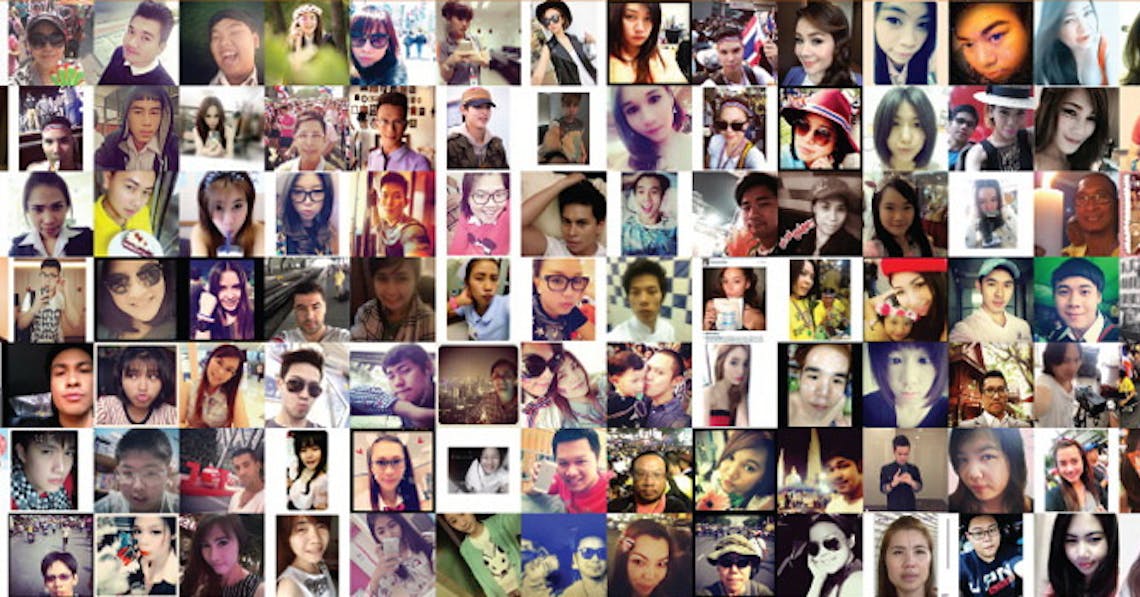So, Oxford Dictionaries’ Word of the Year for 2013 was selfie, beating out bitcoin, binge-watch, twerk, and the clear underdog, olinguito (which for the record is a small furry mammal from South America that will now never get its due day in the sun, because we’re all too obsessed with our own faces). #sorryolinguito.
Defined as “a photograph that one has taken of oneself, typically one taken with a smartphone or webcam and uploaded to a social media website,” the selfie garnered a rather mortifying 17,000 percent increase in usage since the previous year, according to Oxford’s editors. And while Word of the Year is usually shared by two different words from the UK and the US respectively (for example, last year’s words were “omnishambles” and “GIF”), selfie steamrolled the competition and won the title on both sides of the pond, proving that selfies are more than just a passing trend; they are a global phenomenon.
Selfies, Inc.
Here in 2014, the selfie has shown no signs of decline. Type #selfie into the Instagram search engine and it will turn up 89,044,418 posts (at time of press – a number that increased by over eight million since I started writing this article) and counting. #Me is the third most popular hashtag on Instagram, with well over 200 million posts, and examples of global selfie madness abound, from funeral selfies (which, according to a newspaper in Alabama, are also known as “corpsies”), to crying selfies (look it up on Buzzfeed, and feel simultaneously horrified and transfixed, sort of like watching a car crash), to the ubiquitous duck face selfie (for some reason still not illegal in any countries – I checked).
As proof of its staying power, the trend has already spawned a whole generation of new products, apps and websites to go along with it. A Kickstarter crowd-funding project based in Hong Kong recently garnered nearly 10 times their funding goal (a total of $94,943 USD) by introducing a product called the Muku Shuttr, which allows users to take smartphone selfies from any distance via a handheld Bluetooth remote. Last fall, selfie addict and bonafide idiot Justin Bieber invested $1.1 million USD in a selfies-only app called Shots of Me. Meanwhile, while Selfie.com is still a techno-mystery (the landing page offers only the cryptic message “See you soon”), there is a lovingly maintained site called MySelfiePage.com that opens to a list of playable music videos, all relating to selfies. Once you sign up (which I did, in the name of journalism, using a fake email address and a picture I found online of a man holding a cat) you enter a rather depressing virtual realm that resembles an AOL chatroom from the mid-90s, offering personal profiles, selfie albums, and something ominous called Selfie Roulette which was too slow to load for the Citylife server/my attention span.
But why? Why do we selfie? Much has been said about this, about what spawned such a specific and audacious global inclination and what it means for us as humans. There’s no easy answer, but the general consensus is that we are a bunch of overstimulated, over-digitalised, self-obsessed narcissists incapable of really caring about anything or anyone beyond our cold little screens.
In a New York Times op-ed from 2011, author Jonathan Franzen noted the “transformation, courtesy of Facebook, of the verb ‘to like’ from a state of mind to an action that you perform with your computer mouse, from a feeling to an assertion of consumer choice. And liking, in general, is commercial culture’s substitute for loving.”
In a 2012 TED Talk, Sherry Turkle, a college professor at the Massachusetts Institute of Technology who studies the relationships between people and technology, said that social media provides “the illusion of companionship without the demands of friendship.” She laments that our obsession with technology is causing us to lose the “raw, human part of being with each other,” and adds, “Our little devices are so psychologically powerful that they don’t only change what we do, they change who we are… I share, therefore I am.”
It’s a depressing and rather terrifying place we’ve ended up, it seems. And indeed, I agree with all of the above points, which represent only a miniscule portion of the ongoing discourse on social media, on the selfie and its implications and everything that goes along with it. It is a discourse that often dips back into history, comparing the onslaught of selfie syndrome with the invention of the camera, with the first self-portrait, with the first time someone saw their own reflection in a lake. But what’s important to note is that while valuable, nearly all of this discourse is coming exclusively from the Western world.
Amazing Thailand
Meanwhile, here in the little country of Thailand, it’s safe to say that the social media obsession has reached boiling point. In early 2013, a report established that 80 percent of Bangkok’s population have registered Facebook accounts (compared to under 50 percent of America’s). Meanwhile, Bangkok has held the top spot for most Instagrammed place in the world for two years running. In 2012, it was Suvarnabhumi Airport. In, 2013 it was…Siam Paragon. Yes. The most Instagrammed place on the entire planet is a mall in Bangkok.
Interestingly, Thailand’s social media obsession hits only two out of what we’ll call the Big Three; Thais are not even in the top 20 when it comes to Twitter users. “Thais don’t like to read much,” quipped writer Monruedee Jansuttipan in a BK Magazine article detailing the statistics. And indeed, Thailand’s social media obsession seems very much planted in the visual.
“You have to live under a rock not to notice the selfie trend in Thailand,” said Thai social critic and journalist Kaewmala in an interview we did, rather ironically, over Facebook. “I find it a bit too self-absorbed and self-indulgent for my taste, but then it’s SELFie. The focus is supposed to be on the SELF.”
In February, Thailand’s Department of Mental Health (DMH) issued an official warning to Thai youngsters addicted to selfies, cautioning them that the obsession could result in a loss of confidence and negative impacts on life and work.

“A selfie creates an impact, more or less, on one’s everyday life,” said DMH deputy director-general Dr. Panpimol Wipulakorn in a public statement. “Posting photos to seek approval and ‘likes’ from peers as a reward is normal human nature. But the reward has varying degrees of emotional effects on each individual. Some people are happy after sharing a selfie and getting a few likes, while others expect as many likes as possible and become addicted to being liked.”
She continued, rather ominously, “If Thai youth become lacking in confidence, this means they are unlikely to try new things in their lives and they will simply follow or imitate others – and that will make it hard for them to develop themselves. This could affect the development of the country in the future as the number of new generation leaders will fall short. It will hinder the country’s creativity and innovation.”
When I asked Kaewmala her thoughts on this prognosis, she seemed sceptical. “I think we’ve got more fundamental problems than youthful obsession with selfies,” she said. “The DMH might be mixing the symptom with the cause of social ill – if it’s a social ill. Extreme popularity of selfies in Thailand seems to me more symptomatic of Thai education and socialisation that values form more than substance. It’s appearance over content – outside as opposed to inside. The manifest face culture in the digital era.”

Indeed, Thailand’s selfie obsession could be illustrative of something deeper, and more culturally specific. As TIME Magazine’s take on the situation (titled “Nobody Liked My Selfie and Now the Country Is Going to Hell”) pointed out, even Thailand’s recent protests often seemed more like a selfie party than a political demonstration. “We call them Instagram protesters,” said a local Thai TV producer quoted in the article. “They turn up and take photos of themselves, but when we interview them they can’t say what the protest is about.”
So Thailand is obsessed with selfies, and the government is worried that they could lead to the country’s downfall. Meanwhile, those who are protesting the government often seem more interested in being pictured protesting the government than actually understanding what they’re protesting. But why?
Facing the Face
“Thai people are searching for identity,” said Dr. Wayne Deakin, a long-term British expat, philosopher and professor of English at Chiang Mai University. “The hole in Thai culture is massive. The protests give a great vehicle for people to get out there and gain some recognition, positing a sense of identity and self on the scene.”
It makes sense, then, that selfies and protests go hand in hand here in Thailand, as they are essentially filling the same void. Deakin’s theory is that selfies provide a kind of “instant self-affirmation,” a way to assert one’s individuality and gain recognition from peers without disrupting the hierarchy. “Thailand has this kind of illusory image of collectivism,” he said. “It may appear to outsiders to be very homogenous, but in reality, it’s divided and atomised. There is a hierarchical structure here, a hidden caste system.”
He paused. “Selfies are a chance to liberate yourself, in a small sense. Selfies are a way to get your face out there without fear of losing face.”
In the West, we are obsessed with ideas of asserting our independence and individuality because we are told from the start that we are special and unique. But as a paper published in the prestigious journal of Behavioral and Brain Sciences recently proved, culture factors much more deeply into cognition than we had all previously assumed. In fact, the paper’s researchers revealed, Western cognition is not at all indicative of how the rest of the world thinks and feels. We are the outliers.
“The ‘weird’ Western mind is the most self-aggrandising and egotistical on the planet,” summarised Ethan Watters in a story about the paper. “We are more likely to promote ourselves as individuals versus advancing as a group.” Maybe that’s why we’re leaders in technology and innovation but achieved very little during our Occupy protests.
For Thais, even in a rapidly globalising world where Western trends are gobbled up like candy, the cultural terrain is very different. “The development of Thailand has already been long affected by lack of self-reflection,” noted Kaewmala. “The excessive attention to selfies lamented by the DMH shows the wrong-headed focus this country has had on the exterior of the self – appearance, image and perception – which is at the crux of Thailand’s stunted development of the interior self over the past many decades. Generations of Thais have been taught to accept the uniformed knowledge, the kind of knowledge that is ready-made and spoon-fed and not to be questioned.”
Indeed, Thailand is not the land of the free and the brave. It’s a society long marked by intense cultural control, by rules, expectations, and forced collectivism, where speech isn’t free and individuality isn’t celebrated. Just look at the efforts of Field Marshall Plaek Phibunsongkhram back in the early 1930s, establishing and enforcing a new definition of “Thai culture” by disseminating flyers telling people how to dress. Today, education and industry are still held back by antiquated notions of “Thainess” and the peer pressure (often manifested through social media) to maintain it. So, is it any surprise that Thailand’s youth find themselves dazzled to the point of addiction by an opportunity to assert themselves as individuals, even if that opportunity is as inconsequential as posting selfies on Instagram of themselves trying on a hat at the mall?

“People don’t realise how subversive the selfie is in a culture like this,” said Deakin. “The fact that the DMH warned people against selfies is interesting, and while their explanation makes sense, it also makes you wonder about the agenda there. There’s a sense of higher entities using demagogy and rhetoric to hang onto power any way they can. They might be thinking something along the lines of ‘know your place, why are you putting your face out there? This is unThai behaviour. Of course, Thainess is a construct, but it’s deeply entrenched.”
Another thing that’s interesting about the DMH’s warning is the advice they give to selfie addicts on the road to redemption, suggesting that if they “pay attention to people and things around them in everyday life and spend time doing activities with family members and friends such as exercising, watching movies and travelling” then things will get better.
“All the activities recommended are good alternatives to obsession with selfies,” Kaewmala consented. “However, do you notice that they have little to do with interior self-development? Where is the recommendation for reading books, to improve your minds? To create with arts, ideas?”

In a recent project backed by several American universities called SelfieCity, researchers explored the impact of selfies on society by collecting Instagram shots in five major international cities, including Bangkok. They found that Thais held the record for most smiling selfies, as well as most male selfies (with a 45:55 male to female gender ratio in Bangkok compared to 18:82 in Moscow). To me, in conjunction with my own observations, this suggests that here in Thailand, selfies are a joyous practice, not something to be done hidden away in a bathroom or crying under the covers, but proudly, across gender barriers, and with a smile. And at face value (pun intended) this seems like a positive thing, but what if the joyous and uncritical view that Thais have of the beloved selfie is in fact just blissful ignorance to their potential implications, both positive and negative?
“Most Thais pay much attention to the exterior self and want to be in control [due to] sensitivity about self-image, but our interior self as individuals and society has been badly neglected,” said Kaewmala. “And that’s probably where Thai people and authorities should pay attention. I personally don’t have problems with people taking or paying attention to selfies. We actually need more selfies, but of a more intellectually reflective kind than the superficial, over-materialistic one.”
